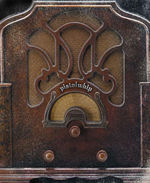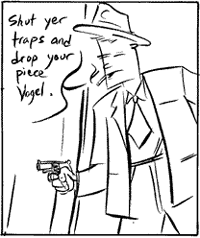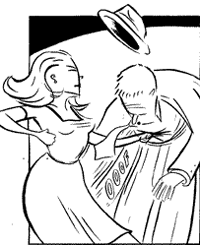
 Writer: Matt Kindt, with Jason Hall
Writer: Matt Kindt, with Jason Hall
Artist: Matt Kindt
Layout Assist: Jason Hall
Price: $14.95
Publisher: Top Shelf Productions
ISBN: 1-891830-23-6
PISTOLWHIP is that rarest of comics; one that's truly unique. It's immersed in the world of pulp novels and old-time radio (as if the cover wasn't enough of a clue), plus the cinema of David Lynch and the Coen Brothers, the intricate structure of films like THE USUAL SUSPECTS, PULP FICTION and MEMENTO, and the suffocating paranoia of Coppola's THE CONVERSATION. But it's something entirely apart from all of those, something utterly new and different. In this book, creators Matt Kindt and Jason Hall have made one of the most assured, even groundbreaking debuts in recent years.
PISTOLWHIP opens with what appears to be a typical crime noir story - Mitch Pistolwhip, a second-rate, fairly inept private eye, inadvertently earns the wrath of femme fatale Charlie Minks, who in turn is after a hapless European musician named Mr. Vogel. Their paths all converge in a shoot-out that, like most things in this book, isn't quite what it seems.
After this opening section, the book spends the next three sections flashing back to show what happened before and after that shooting for each of the characters in that room, both deciphering and adding to the mystery. Mitch Pistolwhip isn't exactly the hard-boiled PI he seems to be. Mr Vogel isn't quite the sinister figure you might think. And Charlie Minks isn't nearly as tough or in control as she appears, and may be the biggest victim in this situation.
Observing all of this is a wheelchair-bound old man known only as Pretzel, who surrounds himself with pirate-outfitted henchmen and adapts the events around him into an inane radio drama.
The structure of PISTOLWHIP takes some getting used to - the book really needs to be read twice to be fully appreciated, with its intricacies slowly revealing themselves. It's fortunate that it was released as a stand-alone graphic novel instead of in a miniseries format (though the creators did design it this way in case they couldn't sell it as a GN).
 Part of the fun of PISTOLWHIP is being able to go back and reread certain portions to fill yourself in on details you may have missed before. While the reader knows what's going on in Mitch, Vogel and Charlie's heads, the characters remain unaware of each other's motivations, creating another level of irony and tragedy. There are also countless radio and literary in-jokes throughout the work, encompassing everything from Orson Welles to Virginia Woolf.
Part of the fun of PISTOLWHIP is being able to go back and reread certain portions to fill yourself in on details you may have missed before. While the reader knows what's going on in Mitch, Vogel and Charlie's heads, the characters remain unaware of each other's motivations, creating another level of irony and tragedy. There are also countless radio and literary in-jokes throughout the work, encompassing everything from Orson Welles to Virginia Woolf.
Another unique aspect of PISTOLWHIP is the format. Aside from its dead-on appearance as an old-time radio, PISTOLWHIP is designed in a rectangular size that's slightly taller and slightly wider than a "normal" comic book. Kindt and Hall also worked together in constructing the art, and were able to get away with an astounding variety of visual tricks that many better-known creators still can't pull off. An average page uses a nine-panel grid, but others use a variety of wide panels, long panels and countless elaborate designs and mise en scène.
Kindt's deceptively simple artwork helps this all flow smoothly - through the use of clear, almost cartoony line work, he is able to bring a clear, easy-to-follow quality to what in other hands could be an incomprehensible mess.
Each panel is filled with smooth, solid blacks and whites, creating a distinct chiaroscuro effect; the reader is instantly able to recognise the intent and importance of each panel the moment he sees it. Bizarre, dreamlike images float through the story - a man trapped within a diving suit at the bottom of a watery graveyard, the POV of a drugged man trying to stay awake, a carnival full of freaks - but the result comes across as seamless. You don't question the strangeness of PISTOLWHIP's world - you accept it as it is, and allow yourself to become part of it.
 There's a method to PISTOLWHIP's madness, though - in the end, an air of sadness hangs over the tale. PISTOLWHIP isn't simply weirdness for weirdness' sake; everything pays off, and the tale becomes a profoundly moving story about the need to control the world around us, to create a reality that exists on our own terms, however deluded or unlikely that reality may be. The idiotic would-be detective Mitch Pistolwhip isn't that different from the manipulative, murderous Pretzel; each wants to be somebody important in a world that sees them as freaks, while Minks and Vogel find that leading the lives they want means nothing if it's on Pretzel's terms.
There's a method to PISTOLWHIP's madness, though - in the end, an air of sadness hangs over the tale. PISTOLWHIP isn't simply weirdness for weirdness' sake; everything pays off, and the tale becomes a profoundly moving story about the need to control the world around us, to create a reality that exists on our own terms, however deluded or unlikely that reality may be. The idiotic would-be detective Mitch Pistolwhip isn't that different from the manipulative, murderous Pretzel; each wants to be somebody important in a world that sees them as freaks, while Minks and Vogel find that leading the lives they want means nothing if it's on Pretzel's terms.
PISTOLWHIP is ultimately about dreamers - the people who, no matter how insignificant they may be, still believe in a world where they can be something more than what they are. With PISTOLWHIP, Kindt and Hall have succeeded in creating a reality that does exist on their own terms. The result is a one of the most unique and fascinating worlds seen in recent comics, one that they will hopefully continue to explore for years to come.
There's already been a return visit to the PISTOLWHIP world in the form of PISTOLWHIP PRESENTS: MEPHISTO AND THE EMPTY BOX (Top Shelf Productions, $3.95). This story was published more-or-less simultaneously with PISTOLWHIP, and as a result has often been overshadowed by the longer work. Essentially, it's what PISTOLWHIP would look like in single-issue format - a nice, larger-than-average comic book with a nice color cardstock cover.
The tale is the equivalent of a well-done short story: At a magic show, a husband is horrified when his wife vanishes after an "empty box" trick, and he desperately tries to find her. This being a PISTOLWHIP tale, the story isn't nearly as simple as it first appears, and the tale becomes an ambiguous exploration of identity and jealousy.
It's not quite as brilliant as PISTOLWHIP, but still a very solid read - it's already been optioned for a movie. It could act as either a decent introduction for those considering entering PISTOLWHIP's world - or for those who have already been there, a nice after-dinner mint to hold you over until Kindt and Hall's next full-length production.

This article is Ideological Freeware. The author grants permission for its reproduction and redistribution by private individuals on condition that the author and source of the article are clearly shown, no charge is made, and the whole article is reproduced intact, including this notice.


